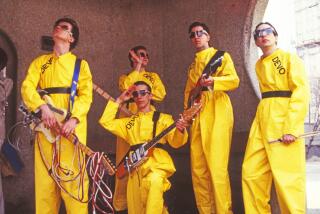POP MUSIC REVIEW : In the Mode for Changes : Tour: Depeche Mode plays first of its dates in Southern California with hints of hopeful things to come.
- Share via
SAN DIEGO — Be careful.
It’s as easy to let Depeche Mode’s spectacular success lead you into the trap of thinking this British quartet is a great band as it is for the success to make you resent the band because it isn’t a perfect one.
Depeche Mode is n-o-t a great rock band, but it has several valuable traits and its success can be seen as an important vote for change in a pop scene very much in need of overhaul.
That’s why it’s encouraging, if not wholly satisfying to see that an estimated 150,000 fans are casting their ballot for the British outfit in a Southern California concert swing that began on Saturday night at the San Diego Sports Arena and concludes with shows this Saturday and Sunday at Dodger Stadium in Los Angeles.
There are more exciting and challenging bands around, but better Depeche Mode than Bon Jovi, Cinderella or Phil Collins.
One healthy sign of the group’s success is that a new generation of pop fans can accept a synthesizer band as heroes rather than insist on groups armed with rock’s traditional guitar, drum and bass arsenal. This is important because rock is badly in need of new textures and character.
Depeche Mode does employ a guitar on a few numbers--most notably in the strikingly appealing “Personal Jesus”--but it relies mainly on a seductive dance pulse that is supplied by three synthesizer players, including songwriter Martin Gore.
While there is a sameness to the group’s sound, Depeche Mode deals in a variety of concrete and purposeful themes--and that is the even more encouraging aspect of its success at a time in pop when the Top 100 charts are so devoid of thought.
Gore’s songs touch on questions and emotions that are especially relevant to the band’s mostly teen/young adult audience--an age span where celebration or partying is both an impulse and a social mandate, but where uncertainty and fear about the future can be almost paralyzing.
Depeche Mode’s dance grooves help you celebrate--the audience Saturday was on its feet, moving to the beat for virtually all of the band’s two-hour set--but Gore’s lyrics also provide comfort and companionship by acknowledging that others, too, are wrestling with feelings of desire and doubt, emptiness and faith, hypocrisy and trust, loneliness and love. They are mostly, but not all, tales of torment.
The messages seem all the more timely because they are accompanied by that relentless, somewhat cold, industrial synthesizer beat that mirrors the fast-faced, generally impersonal nature of life at the start of the ‘90s.
In fact, this synthesizer emphasis helps establish a bond between the band and much of the audience. It’s as if this new generation of rock fans has found its own voice in the synthesizer/dance beat. (Nitzer Ebb, the opening act on the tour, is also a synthesizer band, though its style is far darker and more aggressive than Depeche Mode’s.)
Synthesizer bands have been around for years, but what makes Depeche Mode so successful--beyond its danceable grooves--is its accessibility and showmanship. Gore’s lyrics are mostly straight-forward expressions of universal emotions that require little homework to interpret.
With so much Angst in Gore’s songs, it’s easy to imagine Depeche Mode as a glum, pretentious bunch. But the band seemed refreshingly down-to-earth Saturday as it concentrated on songs from its new “Violator” album.
Lead singer Dave Gahan was as active and upbeat as the leader of any guitar band. He spun as fast as John Mellencamp, twirled the microhone stand as deftly as Rod Stewart and went through repeated bumps and grinds as aggressively as Prince. Unfortunately, Gahan also tended to pose as much as Freddie Mercury--and that became wearisome.
The heart of Depeche Mode’s appeal, however, is Gore’s songs. While striking emotional chords, most lack a compelling literary or poetic edge. This makes them too easily absorbed, all but forcing the more demanding members of Depeche Mode’s mainstream pop-rock audience to move on to the more artful and demanding sounds of U2 and the Cure, among rival stadium attractions.
The challenge for Depeche Mode is to grow with its young audience. While that may be difficult for a group about to enter its second decade, there are signs of growth in the “Violator” album.
Regardless of its eventual fate, Depeche Mode’s success is a sign of change in the rock world at large and that’s good. How ironic that a band so associated with Angst could serve as such an encouraging sign of hope.
More to Read
The biggest entertainment stories
Get our big stories about Hollywood, film, television, music, arts, culture and more right in your inbox as soon as they publish.
You may occasionally receive promotional content from the Los Angeles Times.










